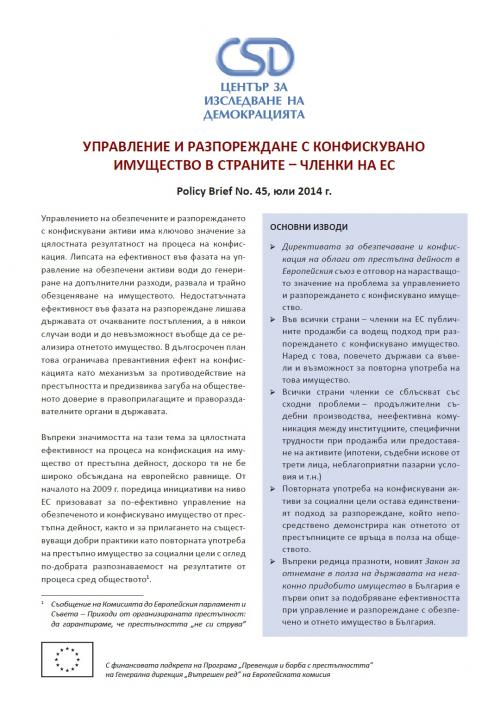

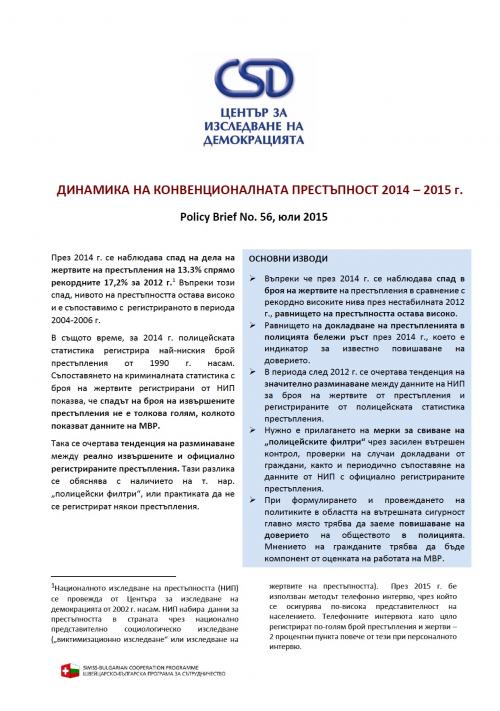
Crime rates in 2014 decreased compared to the record high levels of 2012. Nevertheless, the conventional crime rate remained one of the highest since 2004. Over the past year, more victims reported crimes - a sign of relative increase of confidence in the police. At the same time, there is a continuing discrepancy between data of the victimisation surveys and official police statistics. These are some of the results of the National Crime Survey for 2014, presented in the current situation.
More...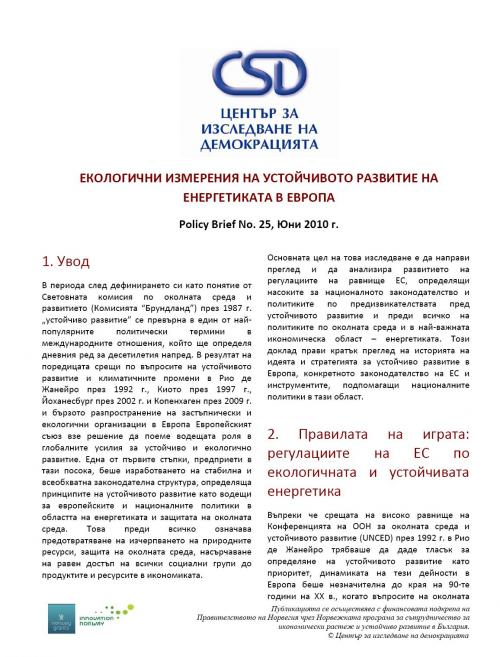
Main purpose of this study is to review and discuss the development of regulation at EU level to guide corresponding national legislation and policies designed to address the challenges of sustainable development, notably those on the environment dimension and as regards to the most relevant economic sector – energy. The paper will briefly examine the development of the idea and strategy for sustainable development in Europe over time, the concrete EU legislation and instruments to facilitate national policies to support such development.
More...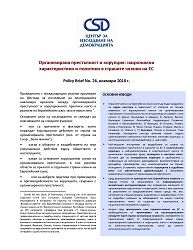
The European Commission (EC) contracted the Center for the Study of Democracy (CSD) to analyse the links between organised crime and corruption. The main objectives of the study were to identify: • causes and factors that engender corruption by organised crime (including white-collar criminals); • the scope and the impact of that corruption on society and institutions; • organised crime’s main corruption schemes, the areas or risks they create, and the related differences amongst European Union (EU) Member States (MS); • best practices in prevention and countering corruption linked to organized crime; framework for a future assessment of trends in the link between organized crime and corruption, as well as corresponding counter measures.
More...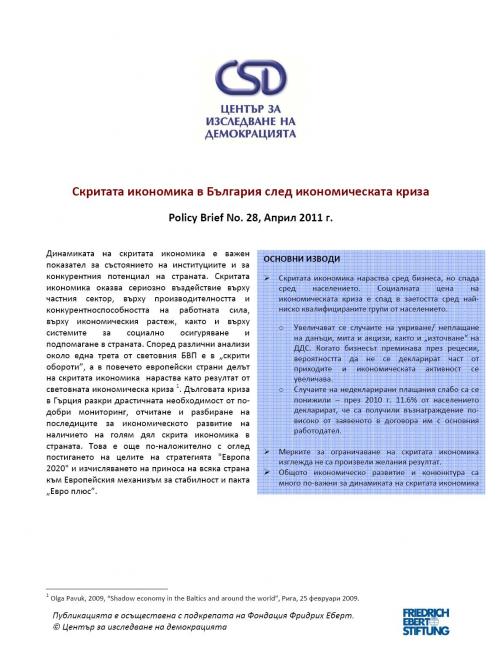
Thе policy brief presents the dynamics and the components of the Hidden Economy Index 2010. It also examines the recent trends in the Bulgarian economic development and expected effects on the informal sector. The dynamics of the hidden economy is an important indicator of the state of a country’s institutions as well as of its competitive potential. The hidden economy has a serious impact on private sector activities, the productivity and competitiveness of the workforce, on economic development and growth, as well as the social security and support systems of the country. According to different estimates about a third of the world’s GDP is within the “shadow turnover”. It is argued that the current financial and economic crisis will result in an increase in the hidden economy in most European countries. The recent debt crisis in Greece has exposed drastically the need to better account for and to grasp the implications of the existence on large hidden economy on economic performance. This is even more pressing in the light of achieving Europe 2020 results and calculating each country’s contribution to the European Stability Mechanism and the Euro Plus Pact.
More...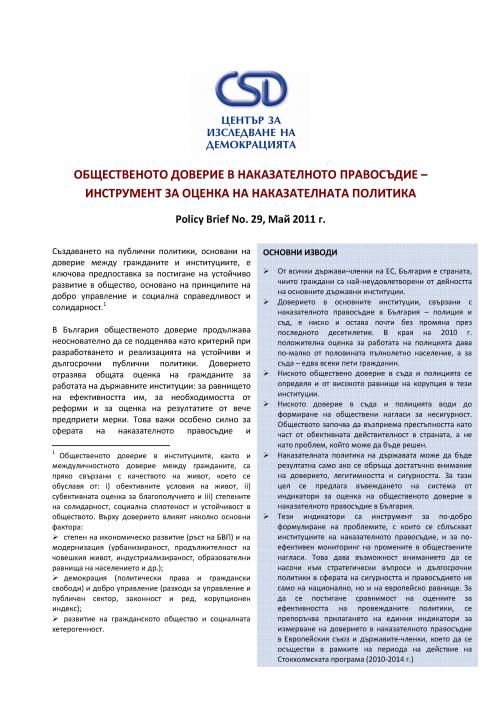
The policy brief presents the results of a survey of the public trust in the police and the courts in Bulgaria, the public perceptions of the level of corruption in these institutions and the fear of crime in the Bulgarian society. Of all the EU member states, Bulgaria is the country whose citizens are the least satisfied with the performance of the main government institutions. Trust in the main institutions concerned with criminal justice – the police and courts, is low and has remained practically unchanged over the last decade. At the end of 2010, a positive evaluation of police performance was given by less than half of the country’s adult population and barely one in five gave a favorable opinion of the courts. The low public trust in the courts and police can also be accounted for by the high level of corruption in these institutions. It is also conducive to public attitudes of insecurity and the society begins to perceive crime as an inherent part of reality rather than a problem that can actually be addressed. A state’s penal policy can only produce results if sufficient attention is paid to trust, legitimacy, and security. It is therefore recommended to adopt a system of indicators for the assessment of public trust in criminal justice.
More...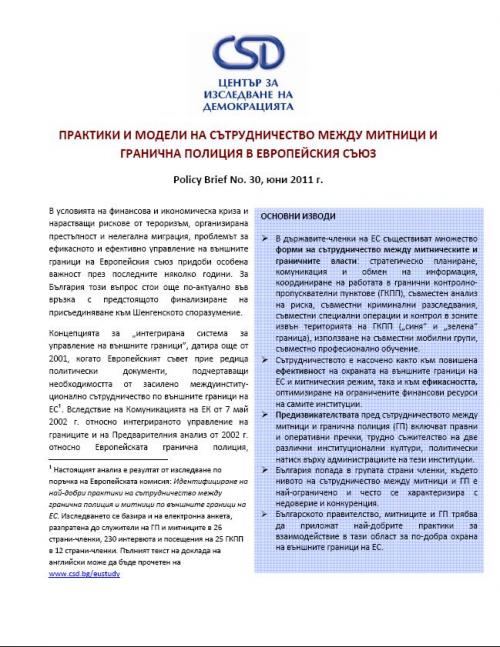
The economic crisis and the increased threats from terrorism, organised crime and illegal migration have brought to light the issue of efficient and effective management of the external borders of the European Union. For Bulgaria it has become even more important with regard to its upcoming accession to the Schengen area.
More...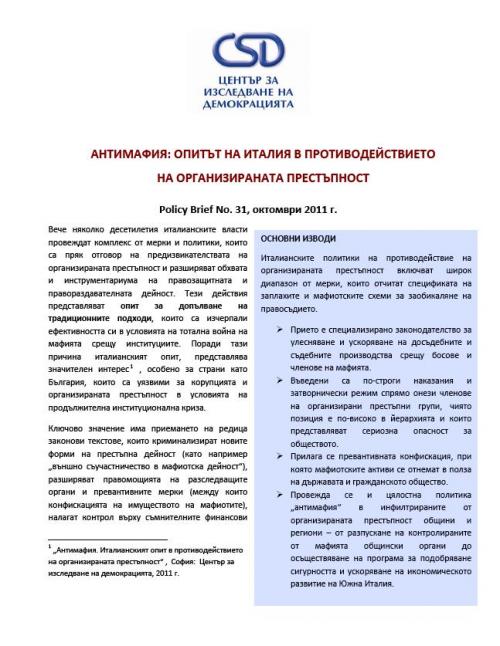
In recent decades the Italian authorities implemented a number of measures and policies as a direct response to the threat of organized crime. These new measures were intended to expand the scope and the number of law enforcement and judicial instruments and were an attempt to complement the conventional approaches, which were no longer effective in light of the persisting mafia influence against public institutions. This is why the Italian experience is specifically valuable for countries like Bulgaria, which are vulnerable to corruption and organized crime.
More...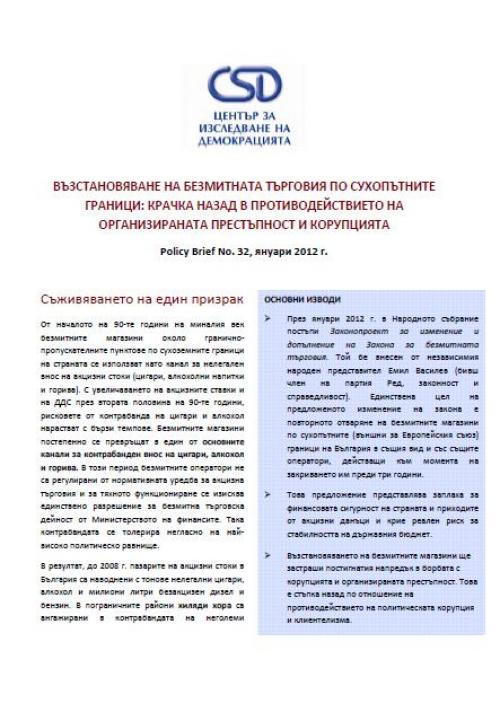
Since the early 1990s the duty-free shops along Bulgaria’s land-border crossings were used as a channel for illegal import of excise goods (cigarettes, alcohol and petrol). With the increase of excise and VAT taxes in the second-half of the 1990s, the risk of alcohol and cigarettes smuggling increased rapidly. The duty-free shops gradually evolved into one of the main channels for the smuggling of cigarettes, alcohol, and fuel. At that period, duty free operators existed without a legal regulation but only with a licensing permit from the Minister of Finance. The smuggling was tacitly tolerated from the highest political level.
More...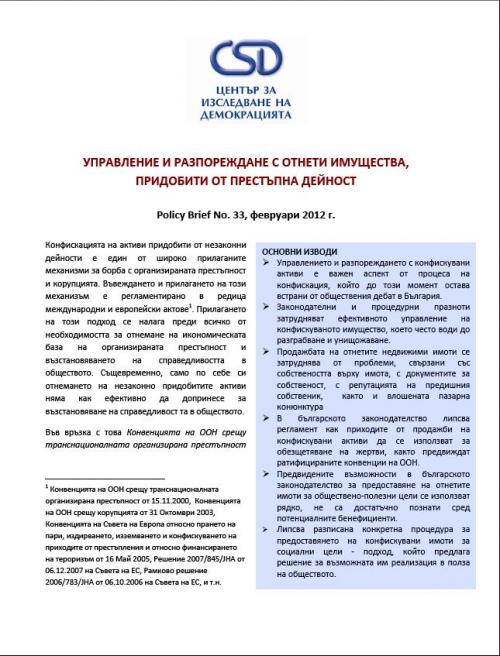
Confiscation of proceeds from illegal activities is a widely applied mechanism in combating organized crime. The introduction and application of this mechanism is defined in several international and European acts, and is motivated by the need to restore social justice. Both the UN Convention against Transnational Organized Crime and the UN Convention against Corruption address the disposal of confiscated assets and recommend its use primarily for compensating the victims of crime. A number of European countries have implemented respective measures and mechanisms like: distribution schemes for compensation of victims of crime, financing of programs for fight against drug use, social re-use of confiscated property.
More...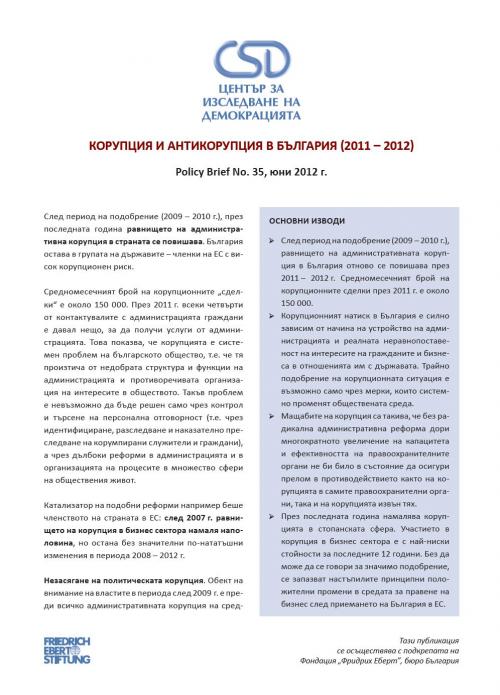
The data on the dynamics of corruption used in the current report are the result of the Corruption Monitoring System (CMS), designed and developed by the Center for the Study of Democracy (CSD) and Vitosha Research. CMS combines significant research and powerful anticorruption advocacy potential. The purpose of CMS is to measure the actual level and trends in the spread of corruption in the country, as well as to identify related public attitudes and expectations. After an improvement in 2010, the level of administrative corruption among the population increased in 2011 – 2012, still placing the country in the group of EU Member States experiencing high levels of corruption. The average monthly number of corruption transactions in 2011 was approximately 150,000. In 2011, a quarter of all citizens who dealt with the state administration had to resort to some kind of irregular payment to receive administrative services. This indicates that corruption is a systemic problem of the Bulgarian society.
More...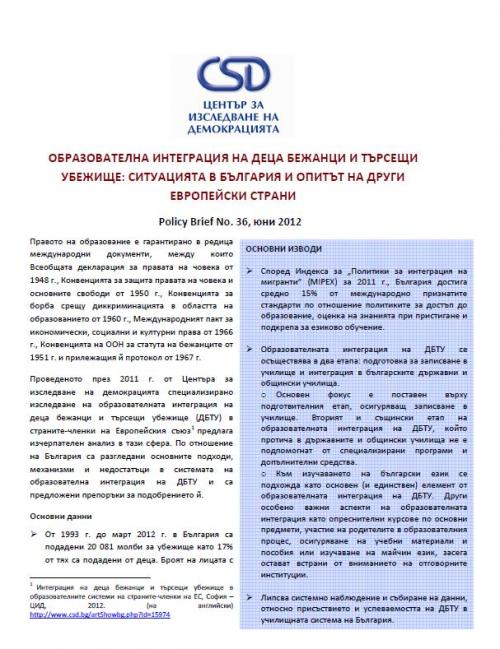
This analysis represents the results of a specialised study of the educational integration of refugee and asylum-seeking children (RASC) in the Member States of the European Union, conducted in 2011 by the Center for the Study of Democracy within the framework on the INTEGRACE project. With regard to Bulgaria, the main approaches, mechanisms and deficiencies in the system for educational integration of RASC were presented and recommendations for its improvement were given.
More...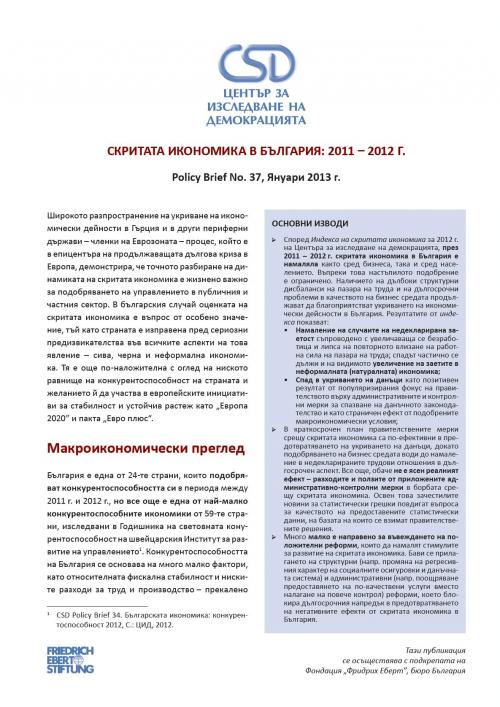
The deep penetration of hidden economic activities in Greece and other peripheral Eurozone members – a development which is at the epicenter of the continuing Eurozone debt crisis, has demonstrated that accurate understanding of the dynamics of the hidden economy is essential for improving public and private sector management. In the case of Bulgaria, an assessment of the hidden economy is an issue of particular importance as the country is facing serious challenges in all of its aspects – gray, black and informal economy. It is even more pressing in the light of the country’s current low level of competitiveness and its aspirations for participation in the European stability and sustainable growth initiatives such as Europe 2020 and the Euro-Plus Pact. The hidden economy in Bulgaria has decreased in 2011 – 2012 among both businesses and the population. Yet, the registered gains are modest. Deep structural labor market problems and long-term business environment issues continue to constitute favorable conditions for the development of hidden economic activities in Bulgaria.
More...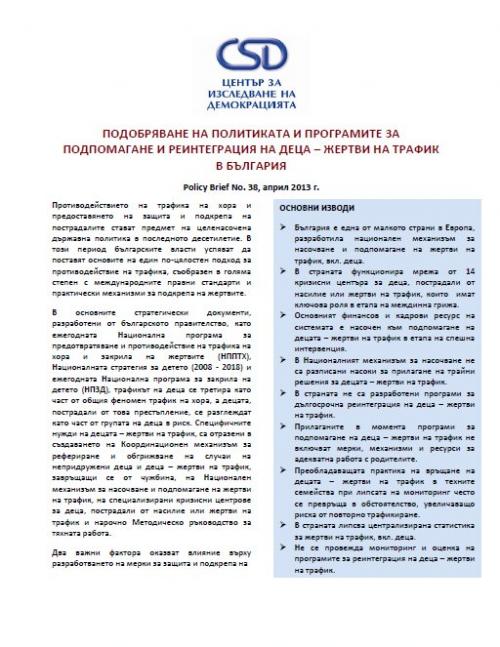
This brief presents the main conclusions related to Bulgaria from a comparative study of support programs and reintegration of children - victims of trafficking in the six member states of the European Union, conducted in 2011 and 2012. The survey was carried out by the Center for the Study of Democracy within the project ARECHIVIC in collaboration with partner organisations from Austria, Italy, Slovakia, Hungary and Sweden. With regard to Bulgaria the main approaches, mechanisms and deficiencies in policies and programs for the reintegration of children - victims of trafficking are presented and some recommendations for their improvement are suggested.
More...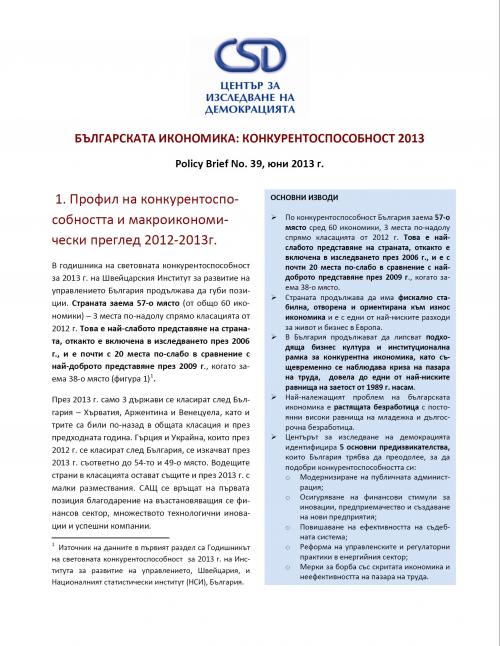
In 2013, Bulgaria is one of the countries that have seen a decline in their competitiveness according to IMD’s World Competitiveness Yearbook (WCY). The country is ranked at 57th position – 3 places below the position achieved in 2012 – 54th. This is the lowest ranking of Bulgaria since its inclusion in the yearbook in 2006 and it is almost 20 places lower than its highest achievement in 2009 – 38th place. In 2013, only 3 countries lag behind Bulgaria in the IMD ranking – Croatia, Argentina and Venezuela and all of them ranked lower than Bulgaria in the previous edition of the yearbook, as well. Countries like Greece and Ukraine both of which ranked below Bulgaria in WCY 2012 move up to 54th and 49th respectively. There are no significant changes in the ‘winners’ trend in WCY 2013. The USA has regained the No.1 position due to a rebounding financial sector, an abundance of technological innovation and successful companies. The 5 main challenges which Bulgaria faces in improving its competitiveness are: • Modernise public administration to increase evidence-based efficiency and regulatory quality; • Reduce administrative costs and provide EU funded incentives for innovation and entrepreneurship; • Strengthen the judiciary to tackle corruption and reduce business uncertainty; • Reform the governance of the energy sector to preserve cost competitiveness, diversify gas supply, and improve energy efficiency; • Tackle hidden economy and related labour market inefficiencies.
More...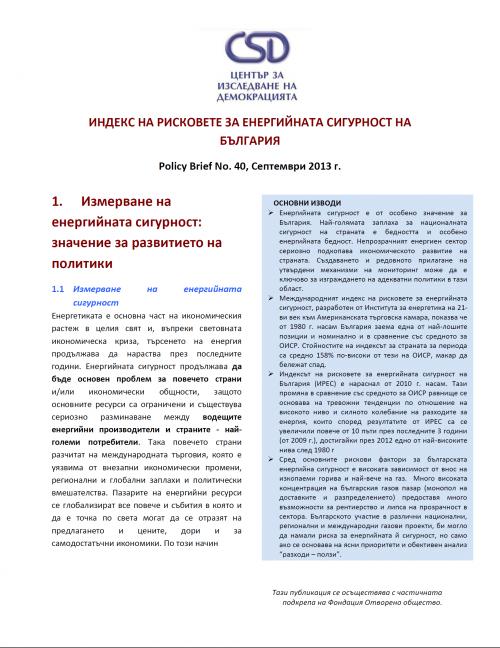
Energy security is of critical importance to Bulgaria. The biggest identified threat to Bulgarian national security is poverty, and in particular energy poverty. Bulgaria’s non-transparent energy sector seriously undermines the country’s economic development. Establishing regular sound monitoring mechanisms on energy security could be key for adequate policy-making in the area. The Index of U.S. Energy Security Risk Indicator (IESRI), developed in 2012 by the Institute for 21st Century Energy at the American Chamber of Commerce shows that since 1980, Bulgaria has had one of the worst energy security risk index scores both nominally and compared to the OECD averages and was ranked in 73rd place in 2012. Its scores over the period averaged about 158% higher than those for the OECD. Bulgaria’s energy security risk index increased since 2010. This recent deterioration relative to OECD averages is based on the energy expenditure volatility of the Bulgarian economy that according to IESRI has increased more than 10 times in the last 3 years (since 2009), reaching in 2012 one of the highest levels since 1980). Among the main risk factors to Bulgaria’s energy security is its high dependence on fossil fuels import, in particular in the gas sector. The very high concentration of the Bulgarian gas market (monopoly of supply and distribution) provides ample opportunities for rent-seeking. Bulgaria’s involvement in various national, smaller regional, and large international projects can reduce the risks to its energy security if it is based on clear-cut prioritization of preferred options following sound and transparent cost-benefit analysis.
More...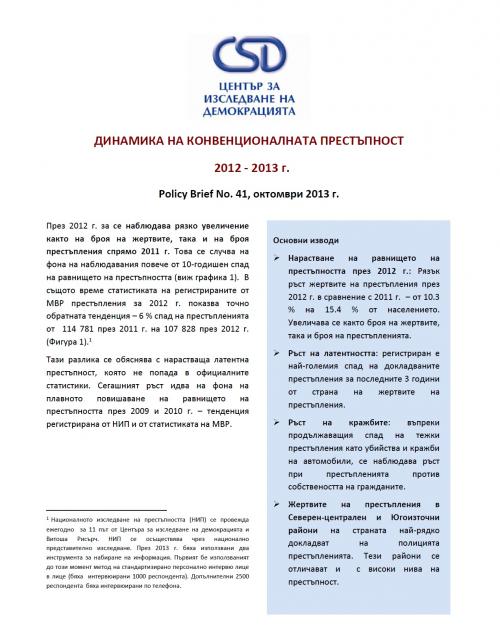
In 2012 there was a sharp increase in both the number of victims and the number of crimes compared to 2011. These trends take place in the context of a 10-year drop in crime rates. Meanwhile, the Ministry of Interior (MoI) statistics of registered crimes in 2012 showed the opposite trend - a 6% drop from 114,781 in 2011 to 107,828 registered crimes in 2012. This difference is explained by the rising level of unregistered crimes that are not part of the official statistics. Victims of crime in South Central and South Eastern regions of the country are least likely to report crimes to the police. These areas are also characterized by high levels of crime victimisation.
More...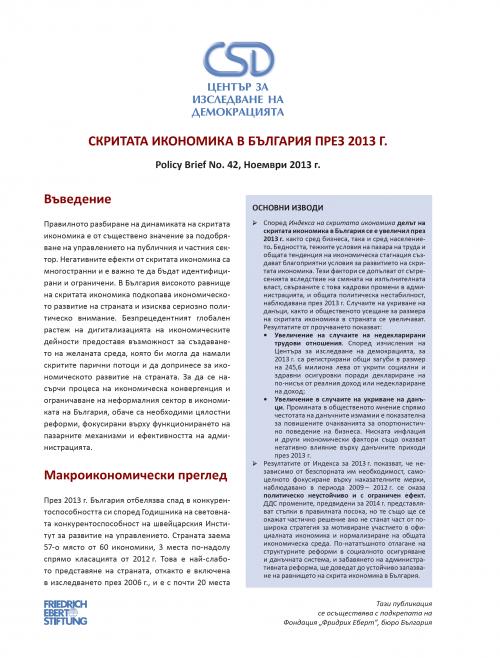
Accurate understanding of the dynamics of the hidden economy is essential for improving public and private sector management. In the case of Bulgaria, the high level of hidden economic activities signals many deficiencies in the functioning of the public institutions and the rule of law, and undermines the economic development of the country. Limiting the grey economy ought to be an issue of imminent priority for policy makers. The recent unparalleled global growth of digitalization of economic activities provides ample opportunities to reduce hidden cash flows and directly contribute to positive economic development of the country. Comprehensive, sustained reforms focusing on improvements in market and administrative efficiency are needed to facilitate the process of economic convergence and limit the negative effects of the hidden economy in Bulgaria.
More...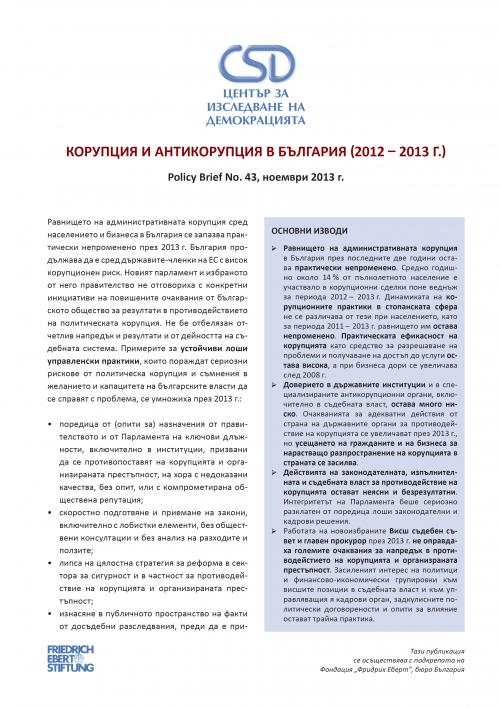
The corruption trends indices for Bulgaria in 2013 are calculated through the Corruption Monitoring System (CMS) developed by the Center for the Study of Democracy and Vitosha Research. The results show that administrative corruption among the population in Bulgaria over the past two years remains practically unchanged. On average, over the period 2012 – 2013, 14% of the adult population has been involved in corruption transactions at least once per year.
More...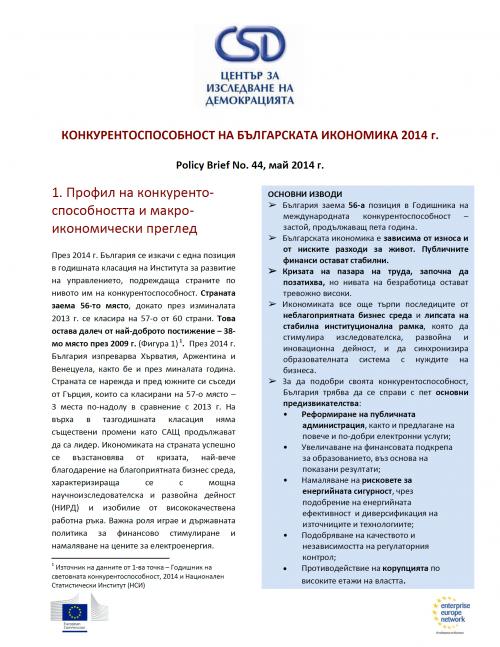
In 2014 Bulgaria regained one position compared to the previous year in the economic competitiveness ranking of the World Competitiveness Yearbook (WCY), published by the Institute for Management Development (IMD). The country is ranked 56th, while in 2013 it was 57th out of 60 economies. This is only a marginal improvement, and remains significantly lower compared its highest achievement in 2009 – 38th place. In 2014, Bulgaria is ranked higher than Croatia, Argentina and Venezuela as in 2013, and has surpassed its Southern neighbor Greece, which has fallen to 57th place, 3 places lower than 2013. There are no significant changes among the most competitive nations in 2014. The USA continues to hold the 1st position, as its economy is successfully recovering from the crisis thanks to a favorable business environment, characterized by a strong R&D culture and abundance of skilled labor as well as to a more accommodating policy stance in providing financial stimuli and lowering energy prices.The Center for the Study of Democracy has identified five key challenges, which hinder the competitiveness of the Bulgarian economy: • Introduce public administration reforms, and more and better e-government services; • Initiate performance-based financing of education; • Reduce energy security risks through energy efficiency and diversification of supply sources and technologies; • Improve regulatory control and compliance quality; • Tackle high level corruption and market capture.
More...